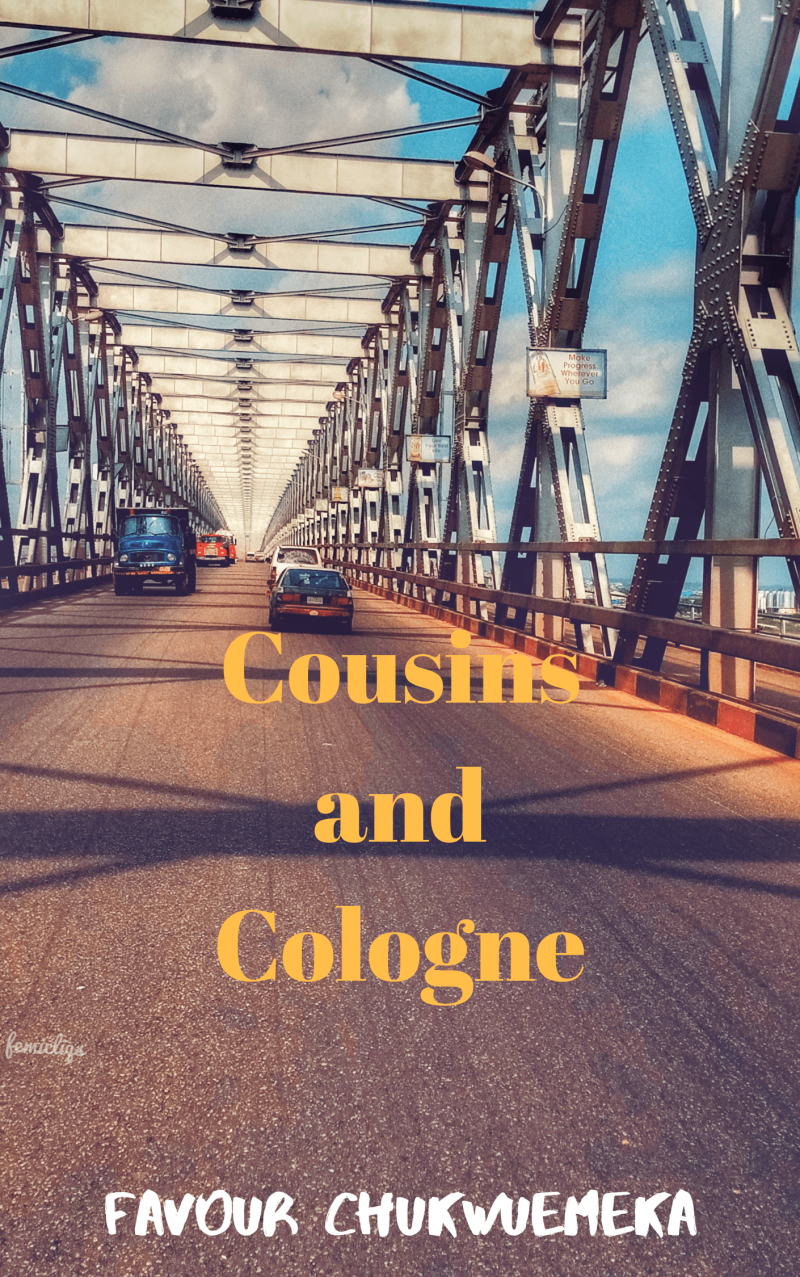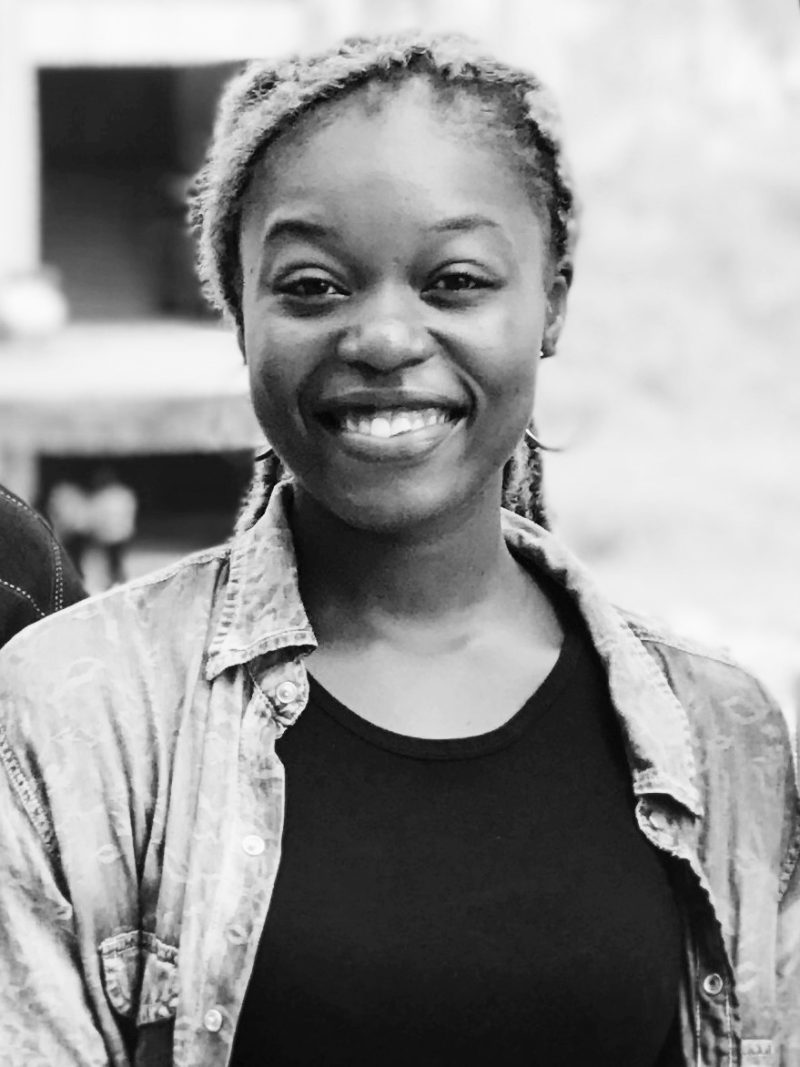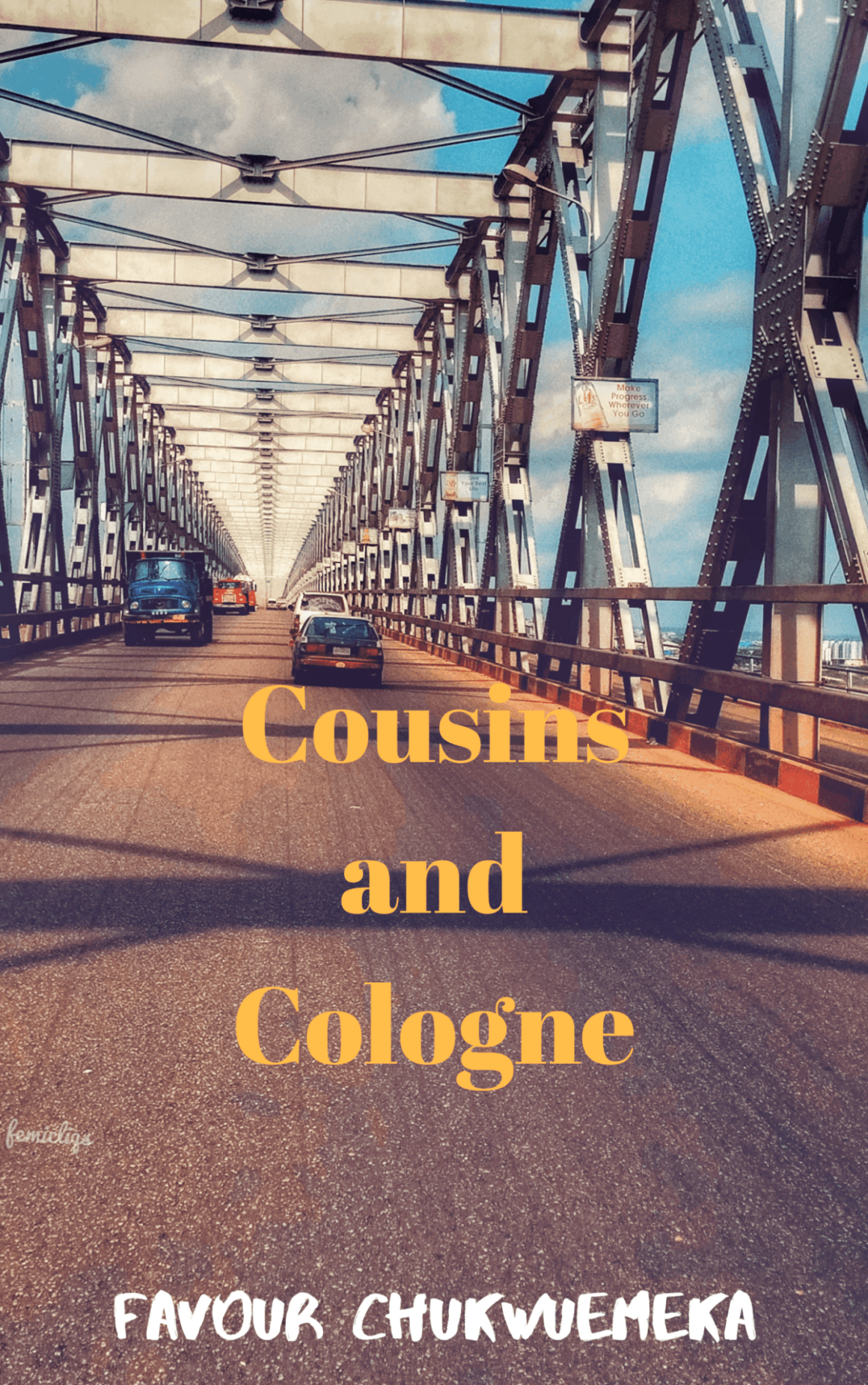
FAVOUR CHUKWUEMEKA
The plane would descend in Asaba in about fifteen minutes. This means that we have less than fifteen minutes to be ourselves. The tea trolley finally leaves the aisle beside me then. I stretch my legs and survey the fluffy clouds.
My sister asks me if her hair is best left unhooked. One look at her makes me suggest she knot it into a bun. She already has the oyibo face, a white boyfriend which she’s obsessed face-timing with, and we would risk our chances of getting along with family if she doesn’t do something about that hair. Mine is much worse; I have got no hair. This is because I do not like hair. However, I make a mental note of pulling the kinky weave-on over my shaved head once we settle in the taxi.
Fourteen years in England and a few minutes in my birth country subtly teaches me that anyone could grow apart from their origin; including me. I see this through my difficulty to flag down any bread seller as they can barely understand what exactly I want. There is no barley bread, whole grain or cheese. My sister finally helps me out; she’s better at this stuff. When I think that the embarrassing moment is over, my mother pipes about how much of the worst is yet to come for me since my refusal to come down to Nigeria for the holidays. I know what she means.
Our village compound hasn’t changed much as I remember it from my dreams. The two houses still stand aloof from one another, a blunt indication that there are two different families, yet one compound. Healthy flowers sprouted elegantly around the other house, but there was none around ours. Wild greens plastered the walls of our house like it’d been a part of the initial architecture.
When I was younger, distance didn’t matter. Much later, the turbulent phone calls my father received from the village since we relocated to England kept educating me that adjustments were being made every day. Now, those changes make sense to me. My mother says she held me in this compound and watched as I bathed in red mud, none of which I remember. An uncomfortable sensation within tells me that I do not ever want to be here.
It takes a while before we transport our luggage from the car into the house. Pairs of eyes keep popping out of the other house as we shuttled from car to house and back. New faces. Old ones turned new. Inside our musty house, I refuse to open the blinds. Beads of sweat cascade down our clay-caked faces, but I wouldn’t dare give an opportunity for them to know what we did behind closed doors. How we disputed on fast food and meals smoked from firewood. Mum’s hushed threats compelling me to never go out without the wig. My mother laments because of the heat; she cannot understand my obstinacy.
The next stop would be to officially salute our grandmother. After twenty-three minutes of hushed arguments and unnecessary delays, we file out behind our mother to our grandmother’s house.
“I heard the gate open, but I didn’t know it was you.” Mama, as she’s fondly called, is a large woman who makes me feel lost in her embrace. She smells vaguely of oil palm and alcohol. “Oh, look at these children. Kosisochukwu. Kenechukwu.”
I maintain my proud smile. Hearing my native name after bearing Michelle for so long is very strange to me, but expected. It is like stepping into shoes I would never wear. I do not think my grandmother knows my full name is Michelle Kosisochukwu Mbonu. We pause, waiting for her to make comments about how we’ve grown long legs and ripe feminine assets, but she doesn’t. She simply looks away and returns to selecting the vegetables for supper.
“Would my son be returning soon?”
“Yes, Mama. He should be back by the weekend,” my mother pipes, grinning. Her bubbly spirit starts to worry me. Half the time, my mother hangs her face, tensed about her long working hours as a nurse. She never smiles for any reason. I observe as she picks up the task of helping Mama split wood.
Back in our musty coven, I think about all the things I could do to stay afloat. My sister abandons me inside to find good network for her smart phone. I watch her from inside as she streams through the receding sunlight, holding out her phone and cursing silently. She, my sister, is completely oblivious of the many eyes watching her from the other house right this minute. They could be shooting pointy arrows with their pointed visions.
At night, there’s a small fire going in the middle of the compound. My cousins have assembled around it, like some tradition, and they’re talking hurriedly. My sister sits, extinct in their company, which I believe to be a lethal mistake. I hear laughs, small chatter, and words that I cannot understand. I see their faces through the glowing embers, how easily they release words in a language we are all meant to speak and understand. We may all bear the names, but not all of us have got the blood. That thick native blood. Last week, I got into a fight with a neighbour on our street who called me black and ugly. Surprisingly, my cousins, they call us white.
“Let’s play a game!” I hear my sister say when I think she should’ve just kept quiet.
“We don’t want any stupid American game,” the eldest of them says. I think she’s about a year older than I am.
“I’m not American. Only British.”
The girl makes a clucking sound that comes out like mockery.
“What game should we play?” One of them asks, her English laden with native Igbo accent. But I smile when she speaks.
“Truth or Dare.”
“I know that game.”
“Me, too.”
“But we need objects. Like a bottle to spin so we can decide who goes first or next,” my sister continues. She holds everyone’s attention now. And for the silliest reason, I’m proud of her.
The door opens and my sister walks in. she heads straight for our box of clothes and starts raking through the contents. “Where the hell is my cologne? Michelle, have you seen it?”
I shake my head, but before I can speak, she screams an ‘I found it.’ I relax, glad the game would at least go on and my sister won’t be humiliated for not following through. When she heads back, I remember that this bottle was a gift from her boyfriend. And that she never let me touch it, even. I do not really know what it looks like; apart from its smell, I don’t know anything else about it. Yet, that precious little bottle is out there on the mud, spinning in the centre of unknown cousins!
“And she came out of her hole.” The eldest looks up at me, when I’m metres away from the fire. The game stops and technically, I am supper for all.
“I came to play.” I try to say the words as slowly and clearly as I can. And I don’t even know why.
“No, I don’t think so. It’s a plan. You and your sister know we don’t know anything about this game. So you came here to beat us.”
“We didn’t come all the way from England to beat you at a stupid game. We came for your marriage ceremony.”
She laughs briefly, her eyes full of resentment towards me. I think the fire heightened the glare in her face.
“No, you didn’t come for that, Kosi. You just came to flaunt yourselves. Your fine boots, long hair, fresh skin like mango. Can you even speak our language? But what does a village girl like me care?”
Some of the kids laugh.
“Stop talking to me like that, please. I am your blood.”
She rises up in fury. “No you’re not. I see you and your sister on Instagram. You both act like you have no family outside your parents. And that is same for me and my siblings.” She points at her snickering siblings. “All of you get inside this minute!”
My other cousins carry their sunken faces inside their house, like they’ve lost freedom of choice. My sister and I remain dumbstruck before the dying fire. I can feel that my sister is disappointed.
“I’m so sorry, Raven—”
She raises her hand. “You never wanted to be here. You could’ve just watched from behind the blinds. I never asked you to help me talk with my cousins.”
Wedding day comes, and the entire compound is in human chaos. My mother won’t stop moving from place to place trying to get things done. I do not want to feel sorry for her, knowing that she has to prove a point before she leaves this place. She speaks more Igbo than she has done in years and to any of her children. Her generosity is overwhelming; she might lose her entire salary if these village women keep singing her praises.
I haven’t seen the bride upfront since the night fire incident. I know she’s angry with all of us, but can I really fix that? Right now, she probably has a dozen of ladies hovering around her face, trying to make her the most gorgeous lady for many miles away. My father, who has since returned, hasn’t stopped moving about, too. The special delicacies arranged for the day makes me mentally compartmentalise my belly. I want to have all the Nigerian stories to regale when school resumes in the fall.
“Kosi, go to the backyard and fetch me some clean plates.” Actually the first time—in decades, my mum is saying something I can understand.
At the backyard, I’m faced with several choices when I cannot readily find plates. Talking to the motherly caterers is not an option; that’s revealing my language weakness too early. Not even the boys who helped in the kitchen because they seem to be checking me out. A stupid idea hits and I divert to the other house to find my sister. Fortunately, I soon discover the cutlery room—which is obviously in this house—and begin to dig for suitable plates. The clanking noise of steel and ceramics irks everyone around.
“What are you doing here, oyibo?” The sentence is in Igbo, and I think I understand it.
Before I answer the many eyes staring at me, someone butts in, in Igbo. “Oh, let me help her. Half the time, she doesn’t understand anything we are saying.”
I feel grateful that my antagonist disperses at my cousin’s voice. The eldest cousin I’ve got. She smiles, her caked face, soft and beautiful.
“What are you doing here? You are the bride and you shouldn’t be seen before time!” One of the women screams from the other end of the backyard.
“It is fine!” She calls back. “I’m going back inside.” Then she turns me. “My baby is hungry. He needs some food. And I couldn’t find a mixing spoon inside the room.”
“Oh,” I gasp. It is too much revelation in few sentences. “I didn’t know you had a baby. Boy.”
“The same way you don’t know my name, Kosi.”
I blink twice. No, I do not recall anything. “I’m so sorry. It’s been so long. I was so young when I left Nigeria.”
“Yes, three. You were only three years old.”
“I am so sorry. I cannot even communicate in Igbo.”
“I can teach you. If you pay me in pounds.”
We share a laugh. “May I see your baby?”
“Of course. Follow me.” We walk side by side, like giddy schoolgirls, and for the first time, into her cubicle. I smell something different. Quite familiar. And then, I see it.
“Did you have this cologne before?” I ask, pointing to the bottle.
“No. Your sister gave it to me.”
“Oh. That’s lovely. I feel jealous. She never even let me touch it.”
“Really? You can now.” She hands me her new-born, who is very tiny in my hands. “My name is Chibundu, nwanne gi nwanyi.”
I hold the new-born and smile, elated at her last words. “Of course. Thank you. Can I know his name, too?”
“He doesn’t have one until now. I will call him Ezinwanne.”

FAVOUR IRUOMAH CHUKWUEMEKA
is a creative writer and poet who hails from Eastern Nigeria. She enjoys writing untold stories depicting the African climate and procuring solutions to contemporary issues through essays.
Currently a student of Chemical Engineering, Nnamdi Azikiwe University, her works have featured in Mbari Storyplace and won the WNDRR Weekly Contest. She has also won the 2020 Mesh Africa Essay Competition. When she’s not reading or writing, she enjoys volunteering.


1 comment
Favour, good job, I loved the resolution. Hope to see more of you.